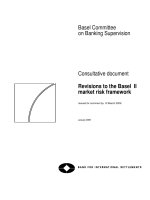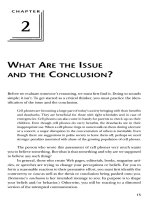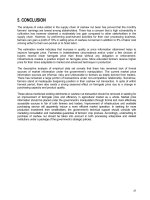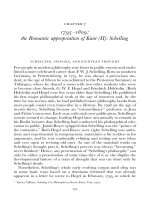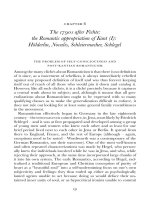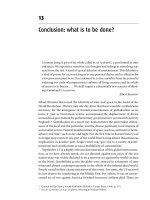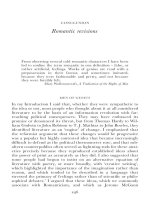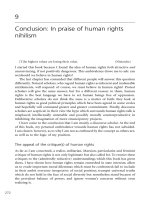Conclusion Romantic revisions
Bạn đang xem bản rút gọn của tài liệu. Xem và tải ngay bản đầy đủ của tài liệu tại đây (75.23 KB, 19 trang )
CONCLUSION
Romantic revisions
From observing several cold romantic characters I have been
led to confine the term romantic to one definition – false, or
rather artificial, feelings. Works of genius are read with a
prepossession in their favour, and sometimes imitated,
because they were fashionable and pretty, and not because
they were forcibly felt.
Mary Wollstonecraft, A Vindication of the Rights of Men
MEN OF GENIUS
In my Introduction I said that, whether they were sympathetic to
the idea or not, most people who thought about it at all considered
literature to be the basis of an information revolution with far-
reaching political consequences. They may have embraced its
promise or denounced its threat, but from Thomas Hardy to Wil-
liam Godwin to John Robison to T. J. Mathias to John Bowles, they
identified literature as an ‘engine’ of change. I emphasized that
the reformist argument that these changes would be progressive
was a popular but highly contested idea that became increasingly
difficult to defend as the political thermometer rose, and that sub-
altern counterpublics often served as lightning-rods for these anxi-
eties precisely because they reproduced established ideas about
the power of print as accurately as they did. I also suggested that
some people had begun to insist on an alternative equation of
literature with poetry, or more broadly, with ‘creative writing’,
which highlighted the importance of the imagination rather than
reason, and which tended to be described in a language that
stressed the primacy of feelings rather than of scientific or philo-
sophical debates.
1
I argued that these ideas, which we commonly
associate with Romanticism, and which as Jerome McGann
236
Romantic revisions 237
argues, continue to structure many of our critical assumptions
today, constituted an emergent rather than a dominant discourse.
In 1817, Coleridge was still able to write of Wordsworth that ‘his
fame belongs to another age’.
2
I want to return to this aspect of the literary culture here, not
to complete some totalizing historical study (an encyclopedic
account of literature in the period), or even worse, to fulfill some
progressivist teleology culminating in the Romantic poets, but to
undermine the either/or scenario that implicitly legitimated the
Romantic canon as a coherent and historically autonomous liter-
ary movement. As with my emphasis on charting the points of
both consensus and difference between the reformist lower and
middle classes, the radical and conservative elements of the
middle class, and radical and conservative feminists, it is import-
ant to recognize that the beliefs which identify Romantic writers
were shaped by their inscription within the very cultural dynamics
that they aspired to emerge out of into the transcendental realm
of human (rather than social) experience.
As I said in my introduction, my concern is not to adjudicate on
the political character of the Romantics’ ideas about poetry and
social relations but rather to explore the political complexities
that are inherent in our own relation to those writers. Critics such
as E. P. Thompson and Nicholas Roe have offered compelling
arguments for the continuing reformist integrity of poets such as
William Wordsworth and S. T. Coleridge. In ‘Disenchantment or
Default? A Lay Sermon’, Thompson argues that their poetic evol-
ution in the later 1790s was less a rejection of reform than of
Godwinian abstraction in favour of a turn ‘to something more
local, but also more humanly engaged’ (36). Roe similarly defends
Wordsworth’s ‘turn from revolutionary politics to marginal life’ as
an ‘imaginative commitment to humanity’ that is ‘strongly con-
tinuous with dissenting and radical theories of human relationship
and community’.
3
Both critics share a sense that Wordsworth’s and Coleridge’s
poetic evolution was shaped by intellectual crisis, but as Thompson
argues, critics who focus on the reactionary element of this crisis
miss the ongoing spirit of affirmation which is also a part of their
writings (36). For Thompson, the problem is not that the Roman-
tic period is foreign to our own experiences, but, on the contrary,
that it is too similar: ‘It is no good if we see only the recoil, or the
The Crisis of Literature in the 1790s238
doubt: yet so obsessed was a recent generation of critics with simi-
lar experiences of disenchantment in their own time, that this has
been the tendency’.
4
Writing in 1968, Thompson was ready to
consign this conservatism to the past behaviour of ‘a recent gener-
ation’, but Roe, writing twenty-four years later, identifies the same
dynamic in ‘the particularly coercive attitudes’ of ‘some new his-
toricist readings . . . to texts, contexts and earlier understandings
of Romantic imagination’ – a disposition that Roe aligns with ‘the
recent failure of Marxism as a force for world revolution’ and the
pressures of living in ‘a post-revolutionary age, dominated by a
‘‘greedy and unsocial selfishness’’ ’.
5
As I said in my introduction, I am also interested in exploring
the political complexities which inhere in our critical relationship
to that period. But I want to do so by posing the question of what
it would mean to read the Romantics in a different context than
the political struggle which tends to frame our encounters with
their work. I want to conclude this book by situating Wordsworth’s
Preface to the 1802 Lyrical Ballads within the broader and more
complex literary landscape that I have sketched out so far – a
move which simultaneously leaves room for other voices and ideas,
and complicates our sense of the relation of the Romantics to
those other literary energies.
The subjectivist ideas about literature that we now call Roman-
tic are frequently read biographically in terms of an author’s con-
solation for political dejection.
6
This may in itself be accurate, but
what is not stressed enough is that writers were responding to
crises in print culture as well, and that in both cases they inverted
rather than rejected the dominant ideas of their day, reformulat-
ing them with an emphasis on private experience rather than the
public sphere. If literature had become the place where an individ-
ual manifestly could not express any idea on any topic, Romantic
arguments stressed the power of the poet to give voice to anything
of enduring human importance, but in a safely internalized world
of individual subjectivity. The supposed inclusivity of the public
sphere re-emerged in the emphasis on poetry as the expression
of truths which applied to all men, or more accurately, to ‘man’
abstracted from any specialist knowledge or social context. I shall
conclude with a reading of one of the main prose texts that we
associate with this argument, but first I want to emphasize the
extent to which this shift in focus was itself a response to the
Romantic revisions 239
combined excesses of the French Revolution and the information
revolution by way of another brief look at Lloyd’s Edmund Oliver
(1798).
Not only did Edmund Oliver teach troubled reformers how to bury
the disruptive spectre of the masculine woman who was deter-
mined to enjoy her share in the blessings of the Enlightenment,
it provided a kind of road map charting the retreat from the public
world of literary engagement to the private realm of pastoral insu-
larity. Structured as the salvation of an Enlightenment reformer,
the novel functions as a kind of before-and-after advertisement for
life beyond the public sphere – both philosophically and biograph-
ically, given Lloyd’s residence with Coleridge in late 1796 and
early 1797.
7
Like Burke, Charles Maurice, who is positioned
squarely at the moral centre of the novel, rejected the possibility
that ‘the constant habit of attack and defence, of intellectual
gladiatorship, adopted in literary and argumentative circles’ could
have anything to do with the promotion of truth (Edmund Oliver,
53):
Youwill hear Edmund, in the circles of London, that the society and
frequent intercourse of fellow beings which towns only admit of, are
necessary to the growth of mind; to calling forth the activities of the
intellect: that men of genius are found in clusters, and that frequent
collision is the only mean of eliciting truth. So far am I from admitting
this as a fact, that I would exactly reverse the proposition: and insist that
no greatness of character, no vastness of conception were ever nursed
except in solitude, and seclusion. (52)
Rather than reject the communicative appeal of the public sphere
altogether, Lloyd emphasized that persuasion, if it was ever to
‘eradicate habits, disentangle the foldings of prejudice, and regen-
erate the mind’, demanded precisely the sort of close personal
relationship which advances in print culture had enabled society
to transcend: ‘we must have gained the confidence of the person
we wish to reform; cultivated sympathies with him; and twined
ourselves round his heart . . . We must be sentient before we can
be rational beings’ (127–30). Whatever Godwin’s optimism about
the ability of ‘the collision of mind with mind’ to contribute to
the general good, Lloyd rewrote the public sphere as a scene of
self-indulgent exhibitionism, a dehumanizing force leading to a
spirit of irrationality that could only be countered through the
intimacy of personal relationships. It may have dressed itself up
The Crisis of Literature in the 1790s240
in the rhetoric of reform, but what most needed to be reformed
were its own excesses. At the end of this road leading away from
the literary public sphere were the creative ideas and energies
of the Romantics, for whom the dream of spiritual regeneration
displaced any emphasis on the utility of rational debate about par-
ticular issues. The keyword for this new emphasis on subjectivist
expression was poetry. Nor, for many of those who held this pos-
ition, could poetry even be reduced to particular texts, which
would be to link it with the objective world of concrete things.
Poetry was more a kind of spirit or mode of perception.
8
There are three main consequences of the cultural dynamics
that I have been exploring in this book for interpretations of
Romantic poetry. First, it means that Romantic poets were situat-
ing themselves not only in comparison with earlier forms of poetry,
but with these prior definitions of literature (as knowledge) gener-
ally. It suggests that they were responding not simply to the
experience of political fragmentation but to crises in print culture
as well. Finally, they were often doing so by reshaping existing
languages of cultural value in private terms rather than departing
from these ‘public’ languages altogether.
As I suggested in my Introduction, engaging with the issue of
professionalism involves shifting our focus away from the question
of national agency to an alternative sense of politics as a struggle
for different forms of distinction. In this latter case, literature’s
significance lies in its potential to serve as a powerful form of
symbolic capital rather than as an engine of social change. Nor is
it a matter of choosing between the two definitions; on the con-
trary, exploring the meaning of ‘literature’ in the period requires
a bifocal approach that is sensitive to the interpenetration of these
alternative political fields. I want to finish by offering a reading of
William Wordsworth’s Preface to the 1802 Lyrical Ballads which
situates a familiar Romantic argument within this more nuanced
cultural landscape that does not assume in advance the primacy
of Romantic values.
WILLIAM WORDSWORTH’S SOCIAL CONTRACT
I want to read Wordsworth’s Preface by expanding on David
Simpson’s comment that Wordsworth’s poetry constitutes ‘a rad-
ical literature rather than a radical literature’ – innovative writing
Romantic revisions 241
rather than politics by other means.
9
More specifically, I want to
suggest that the radicalism of Wordsworth’s literary ideas lies not
in any break which his work may have made with contemporary
assumptions about poetry, though this is what he himself suggests,
but in his estimation of the relative significance of poetry in com-
parison with the more popular idea of literature as the basis of an
information revolution whose implications were both exciting and
worrying. Wordsworth’s arguments for the importance of a more
naturalistic form of poetry are frequently seen as a challenge to
the reductive effects of too mechanistic an emphasis on reason
and to the inadequacies of established ideas about poetry. To an
extent this is obviously true, but I want to suggest that Words-
worth inverts rather than rejects the dominant literary preoccu-
pations of his day, and that in doing so, he offers a far more rad-
ically revisionary view of literature (one which remains influential)
than his more explicit condemnation of ornate poetry would sug-
gest. Whereas professional authors adapted the discourse of classi-
cal republicanism to their own bourgeois ends, Wordsworth
mimics the language of Enlightenment reform in order to legi-
timize his own, very different emphasis on the social role of litera-
ture as poetry, and what is inseparable from that, on the status of
the author as poet.
Like the bourgeois ideal of publicity, Wordsworth bases his esti-
mation of the importance of literature on both its comprehensive
scope and its social inclusiveness: ‘Poetry is the first and last of all
knowledge . . . which all men carry about with them’ (
II
, 396).
Poetry deals with all subjects, and does so in a way that all men
can relate to, simply by being human. This universality has
nothing to do with the range of practical subjects with which lit-
erature concerns itself, though. Instead, and quite the opposite,
poetry unveils a scene of knowledge which is universally binding
to the extent that it avoids particular fields of specialized study.
Wordsworth does not simply reproduce the Enlightenment goals
of universality and inclusiveness in radically subjectivist terms,
however. His description of the nature of good poetry internalizes
a familiar political saga within a wholly literary context. For
Wordsworth, poetry was itself both the site of ‘corruptions’ and
the means of redressing them (406). These corruptions were the
result of the growing preponderance of ‘artificial distinctions’
(399) in the work of poets who ‘indulge in arbitrary and capricious
The Crisis of Literature in the 1790s242
habits of expression’ (387). However pleasing these arbitrary
devices and artificial distinctions might be to the unenlightened
Reader, they satisfy by ‘flattering the Reader’s self-love’ (406)
without appealing to ‘the nobler powers of the mind’ that reside
in the exercise of the imagination (404). Like reformist critics
who celebrated individual merit over the pageantry of aristocratic
privilege, Wordsworth rejects the artificial pomp of unnatural lan-
guage in favour of an alternative form of prestige that is simul-
taneously more basic and more dignified. Poetry which eschews
the false elevation of poetic diction ‘will of itself form a distinction
far greater than would at first be imagined’ (392). It will be both
plainer and more elevated than existing forms of poetry because
it will substitute an accurate reflection of the essential dignity of
mankind for ‘the gaudiness and inane phraseology of many
modern writers’ (386). The more poetry turns its back on what
people mistakenly identify as the trappings of literary distinction,
the greater will its distinction ultimately be.
These artificial and arbitrary practices, which amounted to a
form of conspicuous display based on unnatural hierarchies, were
bad because they appealed to inferior aspects of the human mind,
and also because they had created a gap between poetic language
and ‘the language really spoken by men’ (392). ‘The Poet’ and
‘the Reader’ ought to be united,
10
Wordsworth suggests, not only
because they speak the same language, but because they are
bound by what amounts to a contract. As with any contract, it is
important that both parties understand exactly what it is they are
subscribing to before they enter into a binding agreement. ‘It is
supposed, that by the act of writing in verse an Author makes a
formal engagement that he will gratify certain known habits of
association; that he not only thus appraises the Reader that cer-
tain classes of ideas and expressions will be found in his book, but
that others will be carefully excluded’ (385–6).
Wordsworth is quick to assert that he is not offering the Reader
his literary arguments in ‘the selfish and foolish hope of reasoning
him into an approbation of these particular Poems’, but rather in
order that the Reader will know in advance what to expect from
them (385). He warns the Reader about his poems because he is
well aware that many readers will be convinced ‘that I have not
fulfilled the terms of an engagement thus voluntarily contracted’
(386). Knowing this, he ‘request[s] the Reader’s permission to
